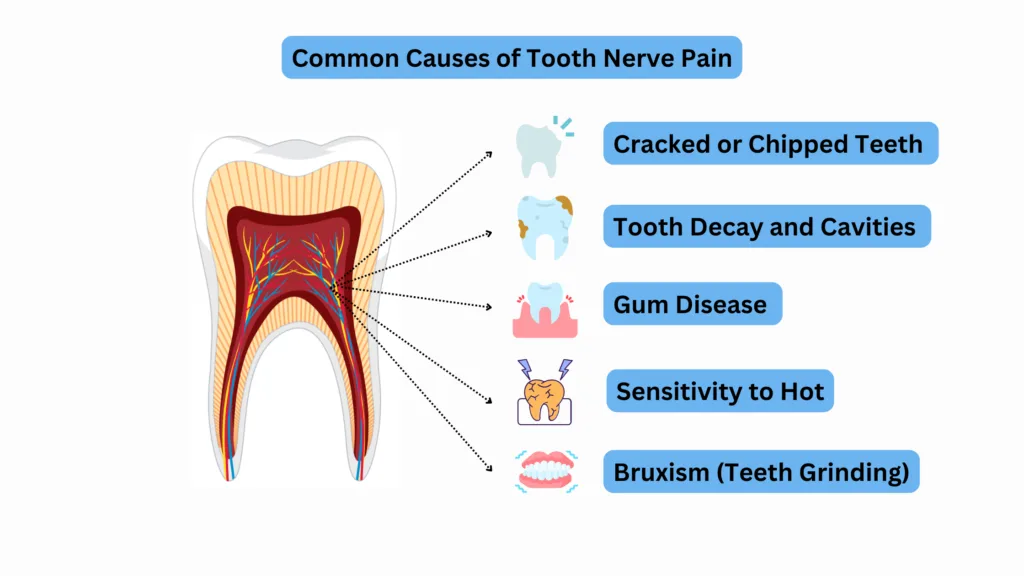Tooth nerve pain can strike when you least expect it—that sharp, shooting sensation that makes you wince. It’s more than just discomfort; it can disrupt your sleep, eating, and daily routine. Whether it’s a dull ache or a sudden jolt, this pain is your body’s way of signalling that something’s wrong.
Common causes include tooth decay, gum disease, or even grinding your teeth while you sleep. And one thing’s certain: ignoring it won’t make it go away.
In this article, we’ll explore the most common causes of nerve pain in teeth, at-home relief strategies, and professional dental treatments—all with tips tailored for Australians seeking fast, lasting relief.
Let’s break down what’s really going on inside your tooth and how to stop the pain in its tracks.
Table of Contents
Common Causes of Tooth Nerve Pain
Understanding what’s causing your pain is half the battle. Here are the usual suspects:

1. Tooth Decay and Cavities
When bacteria feast on leftover food particles, they create acids that wear down your enamel. Over time, this can expose the inner layers of your tooth, triggering nerve pain.
2. Cracked or Chipped Teeth
A crack in your tooth might be too small to see but big enough to cause agony. Exposed nerves from a break can make you hypersensitive to everything from a sip of cold water to a bite of warm pie.
3. Gum Disease and Exposed Roots
Gum disease isn’t just about bad breath. As gums recede, they expose the roots of your teeth, which aren’t protected by enamel. This exposure can make your teeth feel like they’re on edge around hot, cold, or sugary foods.
4. Bruxism (Teeth Grinding)
Grinding or clenching your teeth can wear down the enamel and put pressure on the nerves. Often happening during sleep, many Australians wake up wondering why their jaw feels sore.
5. Sensitivity to Hot, Cold, or Sweet Stimuli
Sometimes, nerve pain is simply about heightened sensitivity. This could stem from enamel erosion or a deeper issue that needs checking out.
Immediate Relief Options
Experiencing nerve pain? Quick relief is within reach. Try these simple home remedies to manage your symptoms:
1. Rinsing with Warm Salt Water
Dissolve a teaspoon of salt in a glass of warm water and use the solution to gently rinse the affected area. This classic remedy helps reduce inflammation and flush out bacteria.
2. Applying a Cold Compress
Wrap a cold compress in a cloth and apply it to your cheek for 15-20 minutes to reduce swelling and numb the pain.
3. Over-the-Counter Pain Relievers
Medications like paracetamol or ibuprofen are lifesavers for dulling the pain. Just follow the instructions and avoid exceeding the recommended dose.
4. Avoiding Triggers
Steer clear of foods and drinks that intensify the pain. This might include hot coffee, ice cream, or sugary treats.
Home Remedies for Tooth Nerve Pain
Nature has a few tricks up its sleeve. These remedies are worth a try:
1. Clove Oil Application
Clove oil has natural numbing properties. Dab a small amount onto a cotton ball and gently apply it to the affected area. It’s a time-tested solution for toothaches.
2. Garlic Paste
Garlic isn’t just for boosting your Spag Bol. Crush a clove into a paste and apply it to the painful spot. Its antimicrobial properties help fight infections.
3. Turmeric
Turmeric, renowned for its anti-inflammatory properties, can soothe discomfort. Create a paste by mixing turmeric with water and apply it directly to the affected tooth or gum.
4. Tea Bag Compress
A used, cooled tea bag can work wonders. Tannins in tea help reduce inflammation and soothe pain. Black tea is particularly effective.
Professional Dental Treatments
If the pain persists, it’s time to bring in the experts. Dentists offer a range of solutions:
1. Dental Fillings and Crowns
For cavities or minor cracks, a filling or crown can seal the deal. These treatments protect the tooth and reduce sensitivity.
2. Root Canal Therapy
If the nerve is severely affected, a root canal might be the best option. This procedure removes the damaged tissue and saves your tooth from extraction.
3. Gum Treatment Options
For pain caused by gum disease, dentists can perform deep cleaning procedures like scaling and root planning.
4. Fluoride Treatments
Fluoride treatment strengthens tooth enamel and reduces sensitivity. This simple, painless procedure is often performed during dental visits.
Preventing Tooth Nerve Pain
A little prevention goes a long way. Here’s how to safeguard yourself from nerve pain:
1. Proper Oral Hygiene Practices
Maintain optimal oral health by brushing your teeth twice daily with fluoride toothpaste and flossing once a day. For an added layer of protection, consider using a mouthwash.
2. Regular Dental Check-Ups and Cleanings
Seeing your dentist twice a year can help catch small problems before they become big pains.
3. Using Toothpaste for Sensitive Teeth
Specialised toothpastes can block nerve pathways, reducing sensitivity over time.
4. Avoiding Harmful Habits
Don’t chew ice, bite pens, or clench your jaw. These habits can lead to damage that’s avoidable.
When to See a Dentist
- Sometimes, at-home care isn’t enough. Seek professional help if:
- The pain is severe and doesn’t subside after a few days.
- You notice swelling, fever, or a foul taste in your mouth (signs of infection).
- Your tooth is visibly damaged or loose.
In Australia, timely dental care is essential. Delaying treatment can make problems worse and more expensive to fix. Options like public dental services and private insurance can help manage costs.
Resources for Dental Care in Australia
Australia has plenty of resources for affordable and high-quality dental care:
- Public Dental Services: Check eligibility for free or subsidised care through your state or territory.
- Private Dentists: Use comparison websites to find dentists in your area.
- Australian Dental Association (ADA): Visit their website for tips and dentist directories.
- Health Insurance: Extras cover can reduce out-of-pocket expenses for dental treatments.
Tooth nerve pain is no joke, but relief is within reach. From simple at-home remedies to professional dental treatments, there’s a solution for everyone. Remember, prevention is your best bet—maintain good oral hygiene and schedule regular check-ups to keep your pearly whites pain-free.
If you’re in Abbotsford or Springvale, the trusted teams at Richmond and Springvale Dental Group are here to help. Our expert dentists provide compassionate care and effective treatments to address your tooth pain and keep your smile healthy.
Don’t wait until the pain gets unbearable. Book an appointment with us today and give your teeth the care they deserve. Your smile will thank you!
Tooth Nerve Pain: FAQs & Solutions
How to Kill Tooth Pain Nerve in 3 Seconds Permanently
While there’s no instant permanent fix, you can temporarily numb severe tooth pain in seconds using:
1️⃣ Clove Oil – Apply directly to the affected area for immediate relief.
2️⃣ Saltwater Rinse – Reduces inflammation and kills bacteria.
3️⃣ Cold Compress – Numbs pain and reduces swelling.
4️⃣ Garlic Paste – Natural antibacterial properties help soothe pain.
👉 Permanent Solution: Only a root canal or tooth extraction can fully eliminate nerve pain. See a dentist for a lasting fix!
Can tooth nerve pain subside on its own?
Sometimes, mild pain caused by sensitivity or irritation might subside. However, persistent pain usually indicates an underlying issue that needs attention.
What should I do if the pain worsens overnight?
To alleviate immediate discomfort, try salt water rinses or cold compresses. Identify and avoid triggers and use over-the-counter pain relievers as necessary. Please schedule a dental appointment as soon as you can.
Are there any specific foods to avoid during a toothache?
Yes! Steer clear of hard, crunchy foods, as well as anything hot, cold, or sugary. Choose soft, lukewarm foods to reduce irritation.
Got a toothache that won’t quit? Don’t let it ruin your day. Take action now and get back to enjoying life with a healthy, pain-free smile!











